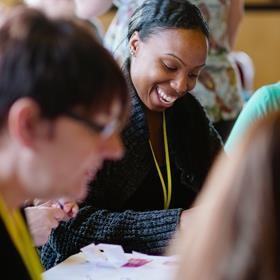ADAPT - continuity and change
Ailsa Swarbrick, FNP National Unit Director
“I’m really excited about the ADAPT programme”
It was wonderful to welcome David Olds back to London last month and to talk about ADAPT. He was on a whistle-stop tour to Europe, also visiting our colleagues delivering FNP in Scotland, Northern Ireland, Norway and Bulgaria.
Towards the end of his stay, David gave the keynote at the Association of Child and Adolescent Mental Health Emanuel Miller Memorial Lecture and National Conference. He outlined the history of the Nurse Family Partnership (NFP, as the programme is known in the US), including his personal story about what led him to focus his work on the very first years of life. He also talked about NFP’s theoretical foundations and its history of rigorous evaluation, stretching back over 40 years.
I know this story well, but often still find something new in the re-telling, and this time I was struck by the theme of continuity and change. Perhaps because we’d just met with Jade Batten, once an FNP client and now carrying her learning and experience into her work as a health visitor. Perhaps because we’d talked with the FNP community about how FNP had evolved over the years, and because we’re right now planning the roll out of some ADAPT changes. Perhaps because the conference was about attachment, part of FNP’s core theoretical base, which David described studying as a student in Baltimore with Mary Ainsworth, who had herself previously worked with John Bowlby at the Tavistock Clinic, now the Tavistock and Portman NHS Foundation Trust, where the FNP National Unit has flourished for the last 6 years.
Or perhaps because he showed a slide of 1970s Baltimore, where his work all started. By a quirk of fate we’d just had a family Christmas there visiting my student son, and I’d witnessed personally the continuing real poverty and deprivation but had also been powerfully moved by the region’s art, history and creativity.
The delicate tension between continuity and change is at the heart of a question I’m often asked, how we hold on to what’s good in FNP while evolving and flexing. Family nurses, in particular, know well the challenges of delivery in the real world and the need for flexibility, while also seeing first-hand the impact a structured, evidenced way of working can have. Change is necessary and valuable, while also hard to lead and hard to live, and sometimes even represents a threat to defend against - I love the concept of a “system immune response” which encapsulates all this beautifully!
So as we think about scaling ADAPT changes, we’ve been reminding ourselves of yet more theory – this time about implementation and improvement science, with some behavioural insights added too. We’ll write in more detail about this another time, but for now here are some guiding principles we’ll be holding onto:
- Humility - observing what’s really happening rather than what we’d like to see – and in the process giving up some power and expert status. That’s partly about good data, which nurses find easy to enter and use, and about making predictions and then accepting when the data proves them wrong and enquiring why. It’s also about looking hard at what’s happening in real life – there’s a Lean Quality Improvement term, going to the Gemba (taken from Toyota), namely going to see the actual work, to understand it and learn. It means us, as a National Unit, listening to clients, nurses and local leaders when they tell us things don’t work even though we’ve crafted them beautifully; and it means nurses questioning their own observations and thoughts about what clients need. I was struck by how the New Mum Star has helped reveal aspects of clients’ lives or feelings that “nurses hadn’t previously seen.”
- Context. “Implementation, by its very nature, is a social process that is intertwined with the context in which it takes place” (Damschroeder, 2009), so as context changes so must the way we work. We’ve responded to the many changes in context since FNP was established in the US over 40 years ago, including the internet and smartphones; new clinical practice, and knowledge; and social changes including to the structure of families and the greater involvement of fathers. And, of course, in the UK, there is the NHS. So, for example, we’ve been testing offering clients an “early graduation” from FNP if they are ready and if their family nurse believes there are other services to meet their needs. One thing we know for sure is that the context will continue to change, often unpredictably, and so we will be alive and responsive to that.
- Finally, though, we will remember and treasure the fact that at the heart of most really good services are people, who form human relationships, have fine-tuned professional judgement and who do unpredictably wonderful things.
